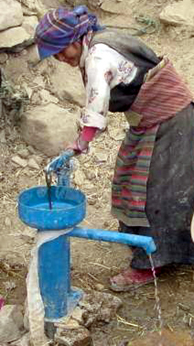
Charles Spangler Dies; Water Supply Expert
Charles Spangler Dies; Water Supply Expert
By Patricia Sullivan
Washington Post Staff Writer
Saturday, July 17, 2004; Page B04
Charles D. Spangler, 92, who designed large water and sewer projects, as well as a hand pump that helps people around the world get clean water, died July 5 of pneumonia after a stroke at Holy Cross Hospital in Silver Spring.
Mr. Spangler invented the hand pump in the 1960s after he observed the mechanical failure of many non-standard and complicated cast-iron pumps in India. Using PVC pipe and materials easily found in Third World countries, such as rubber from tires for the valves, he created a simple device that pumps water and is easily repaired.
"It was his gift to the world," said D. Paul Spangler, his son. "He refused to patent it. I asked him why and he said: 'If I had patented it, the cost of the pump would have gone up appreciably. Our immediate family would have become well off, but the people who needed it wouldn't have been able to afford it. That's my idea of casting my bread upon the water and hopefully I'll be remembered for it when I'm gone.' "
Mr. Spangler's hand pump, and his innovations in the treatment of human waste and in capturing the power of waterfalls or streams to pump water to a village, combined to address three of the most important needs of impoverished communities around the world.
"You use those three things and you reduce to such an extent the amount of diarrheal and dysentery-borne disease that it's a helluva lot better than putting a hospital there," said Jerrold Michael, a professor of global health at George Washington University who worked with Mr. Spangler at the Public Health Service.
Family and friends described Mr. Spangler as an extremely modest and decent man.
Although he had a doctorate, he would not allow anyone to address him as "Dr. Spangler," Michael said.
"What I can say without ambiguity is he had a great love for simplicity and a great desire to help poor people," said Visvanathan Rajagopalan, a former vice president at the World Bank who worked with Mr. Spangler in India and who was his friend for 50 years. "He was very much interested in simplicity -- and as far as possible, use locally available materials -- and making sure local people can be trained to maintain these things."
Mr. Spangler was born in Chicago, graduated with a bachelor's degree from the University of Chicago and received a master's degree in bacteriology from the University of Illinois in 1935. He worked for the Illinois State Health Department, first as a meat locker inspector who was known for carrying a thermometer in his pocket to check the temperature of freezers. His later work led to his interest in the safety of water and sanitary systems.
Mr. Spangler met his wife, a Red Cross worker, during the great flood of 1937 in Cairo, Ill., where the Ohio and Mississippi rivers meet. The town had been evacuated except for emergency workers such as themselves; Mr. Spangler estimated that he and his wife spent only 58 hours together before they married. Determining that he needed a doctorate to advance his career, Mr. Spangler received one in public health from Yale University in 1940. He then went to work as a commissioned officer for the Public Health Service and traveled throughout the United States, Central and South America, Africa and the Middle and Far East, designing water supply and sanitation systems.
Through the Centers for Disease Control, he taught environmental health to technicians from around the world, spreading practical and theoretical knowledge to generations.
Mr. Spangler retired from the Public Health Service in 1968 and went to work two days later for the World Bank as a project manager who worked primarily in the Far East. He retired a second time in 1980.
He rode a Harley-Davidson motorcycle all across the upper Midwest, and owned and flew his own plane. "He told me he had done everything he wanted except drive a tractor-trailer truck," his son said.
Survivors include his wife of 67 years, Hilda Hudgins Spangler of Silver Spring; three sons, Charles Spangler of Rockville, D. Paul Spangler of Sterling and John Spangler of Silver Spring; nine grandchildren; and three great-grandchildren.
© 2004 The Washington Post Company

